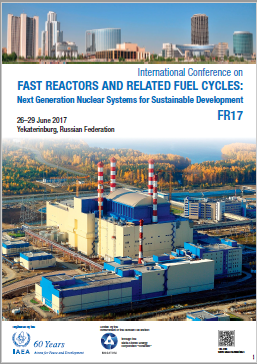Speaker
Mr
Alexander Yegorov
(researcher of Laboratory of Nuclear Fuel Cycle system analysis taking into account National and International tendencies)
Description
The paper presents a methodological study on comparison of nuclear energy systems whose commissioning and commercial-scale operations are in the planning stage. These studies are carried out within the framework of the joint project INPRO.
Systems with numerous technical and economic uncertainties are poorly amenable to technology assessment using the INPRO methodology (for all areas, basic principles and criteria). Furthermore, it seems unreasonable to assess reactor systems in isolation from the system they were designed for. Some indicators from among those that should be referred to the key ones are system-related indicators. They directly affect not only the assessment of reactor facility, but also the characteristics of nuclear energy system as a whole. At the same time, there are indicators, which are slightly related to the system or are generally unrelated to it. Therefore, the study compares particularly the systems with their inherent key indicators, rather than the technologies taken separately.
For the comparison of innovations, a set of key indicators was selected and aggregated into a single function by assigning weights to each indicator. At this stage, there is also an uncertainty both in key indicator assessments, and in determining the importance of each indicator among those selected (weighing factors of indicators).
The paper discusses several key indicators of sustainability for innovative nuclear energy systems from different areas of assessment (economics, technology readiness, waste management). As an example, consideration is given to several types of countries with different nuclear capacity scales. Key indicator weights were selected based on the intrinsic features of the countries; the comparison of innovations is presented. The paper presents the sensitivity of the weights of selected key indicators to the result of innovations comparison.
In addition, the paper identifies the ways of key indicators development. The study of assessment uncertainties using the key indicators could be one of the methodological improvements. Together with the sensitivity analysis of key indicators’ weighing factors, it can significantly promote the study of the comparison of innovations in the context of the methodology described in the paper.
Country/Int. Organization
Russia, State Scientific Centre of the Russian Federation – Institute for Physics and Power Engineering
Primary authors
Mr
Alexander Yegorov
(researcher of Laboratory of Nuclear Fuel Cycle system analysis taking into account National and International tendencies)
Prof.
Valeriy Korobeynikov
(Principal Scientist of Laboratory of Nuclear Fuel Cycle system analysis taking into account National and International tendencies)
Dr
Vladimir Usanov
(Principal Scientist of Laboratory of Nuclear Fuel Cycle system analysis taking into account National and International tendencies)

